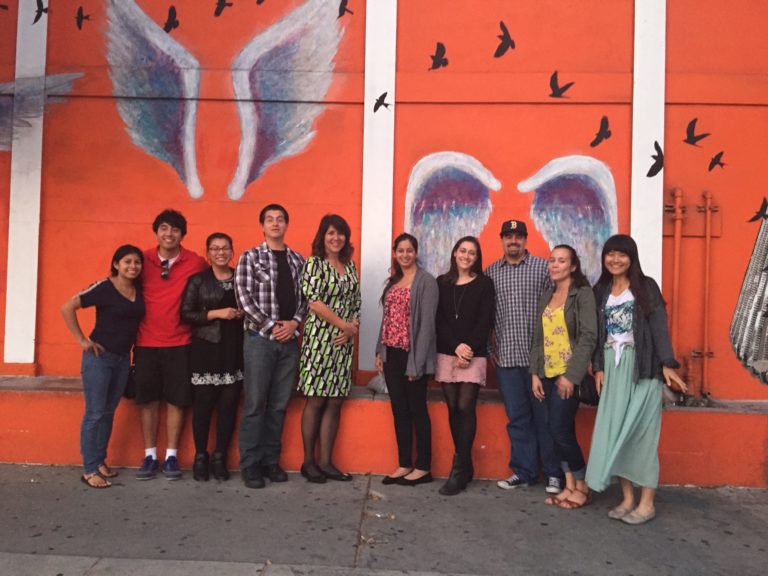
Accessing quality mental health care can be difficult. Racial and ethnic minorities in rural communities in the United States, however, have extra hurdles to manage, especially around stigma, knowledge, and access to mental health services. Professor Denise Chavira’s research group, the Culture and Anxiety Lab for Mental Health Advances (CALMA) at UCLA, targets these difficulties and aims to improve mental health services for underserved groups. They provide therapeutic interventions to children and adults with anxiety at no cost and study the strengths and difficulties of delivering this care. These researchers are dedicated to improving mental health services in chronically underserved communities, and they do so by working and building trust in Imperial Valley, California.
Access to mental health care is not only limited by availability of services or practitioners. The barriers to mental health care for underserved groups begin with a rational reaction to historical trauma wherein they distrust and reject these educational, mental, and physical health institutions. Generational trauma from displacement, war, and ongoing systemic racism impacts the physical and mental health of historically marginalized peoples. In the United States, many people of Mexican origin and other Latinx groups have experienced generations-long struggles in the form of educational and political exclusion, deportation, and cultural vilification. Many researchers have shown connections between these traumas, especially early in life, and a person’s physical and mental well-being. These historical and ongoing traumas can lead to mistrust of any outside entity that attempts to influence their community, reducing the likelihood that they will accept help even when it is well intentioned. For mental health services in particular, trust is a necessary part for beginning and continuing treatment.
Mental health – and especially children’s mental health – is not an island unto itself. Mental health is impacted by many layers of community. The family unit, for example, can be an incredibly protective and positive source of input and feedback to children as they manage big emotions and complicated situations. The community a child lives in, and the larger systems (e.g., government, education, workforce) in which they live also impacts their mental health, and not always in a positive direction. Discrimination, poverty, and for new immigrants, acculturation to life in the United States can lead to increased anxiety in Latinx people. However, by building trust and listening to the perspectives of those whom they serve, researchers like those in CALMA can have a strong positive impact on the community.
The CALMA researchers primarily work in a rural community in the southeastern region of California that is home to a majority Hispanic population. It sits right on California’s southern border with Mexico and is primarily an agricultural center. With an unemployment rate at nearly 4 times the national average and a poverty rate at 22%, many of the people in this community experience deficits in resources even in the best of times. During the COVID-19 pandemic, this Hispanic community has been hit especially hard due to a lack of worksite protections in agricultural sites. In addition to the loss of life, the impact of the pandemic on mental health has been especially difficult for these historically marginalized communities leading to much higher levels of depression and anxiety. These compounding difficulties increase the need for mental health services in an area that is hard to reach and with a community that views outside health professionals with understandable suspicion.

California's Central Valley.
The trip from UCLA to Imperial Valley takes about 4 hours, and Chavira and her team of researchers make the trip about every other month to meet with community leaders. Although the work they do is either remote or in collaboration with local providers, making the effort to meet face to face with local leaders is a key step in building and maintaining trust. These local leaders are school principals, primary care providers, medical directors, and even the president of the junior college. These are leaders that the people in the area already know and trust, so taking the time to create this personal connection goes a long way to show this community that they matter – that these researchers are dedicated to improving the lives of people in this region. By establishing trust with the local leaders, researchers can then be introduced to the general public with the seal of community approval, or as Chavira puts it, “I often felt [the community leaders] were giving this kind of nod of ‘She’s not going to take advantage of the community. She wants to do good work here.’” The trust building between researchers and the population they study and serve is integral to being able to provide services, and that is especially true in the sensitive realm of mental health.
Once trust is established with mental health researchers and providers, they can begin to tackle another barrier: stigma. Stigma against receiving mental health services is common, but especially so in communities that don’t have much access to services or knowledge of mental health problems and their treatments. By bringing therapeutic interventions to this rural community, CALMA group is providing treatments the population may otherwise be unable to access. In parallel to these treatments, they are increasing mental health literacy by providing people with information and being a resource for their questions and concerns. Mental health literacy is an important step needed to access mental health care. After all, if parents don’t recognize behaviors like being withdrawn and staying in their room as possible symptoms of depression, parents are less likely to seek treatment for their child. Increasing mental health literacy in turn makes people more likely to seek out and accept this help and makes treatments easier for families to engage with.
These issues of stigma, access, and low mental health literacy are especially important to target in Latinx communities. As Chavira explains: “From a Latinx perspective, you don’t speak about things with people outside your family, but then there’s another circle there and you don’t talk about it with people outside your community either.” This is exactly why the CALMA group works together with local leaders to first build a trusting relationship. The trust and connection allow them to bring the treatments that work in other communities and find the best ways to adjust them to the needs and culture of this community.
Thus, the community-oriented nature of rural Latinx communities can actually be a great strength when providing mental health care to children. In Latinx communities, familism is a strong cultural value that puts the needs of the family above the individual. This value of familism is an incredibly protective factor, especially when Latinx youth are facing ethnic discrimination. Latinx adolescents are much less likely to have anxiety, conduct disorders, and other related issues if they have these strong familism values. By understanding and utilizing the important role of family connection, the CALMA group was able to provide mental health care to the children by teaching parents to deliver cognitive behavioral therapy to their own children. Translating research done with other communities to fit the needs, values, and practicalities of these children and their families is one of the hallmarks of the work coming from the CALMA group.
Medical care requires trust to get buy-in from patients, whether it’s to take the pills on time, show up for the appointment, or to make the lifestyle change that is needed. Mental health care is no exception. In fact, it needs a higher level of trust to get past the stigma that people often feel when dealing with these difficulties. Showing a deep investment in and connection to a community is an essential part of care. For communities with historical trauma, like the Latinx, African American, Native American, and others in the United States, successful health interventions must begin by building trust.
The author, Gwen Price, is a current Ph.D. candidate at UCLA. She studies developmental psychology and spends her free time thinking about how to put science to work for her communities.
Are you involved with an organization or effort that you think might be of interest to the ESAL community? Or have heard about an organization or initiative that you’d like to learn more about? Let us know here, and we may feature it in a future post.